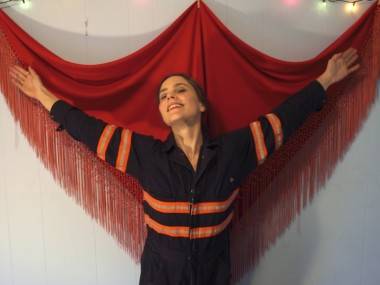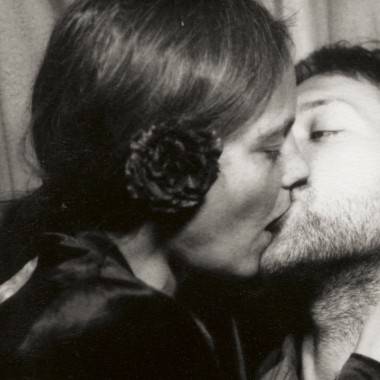Interview – Scout Niblett
– by Shawn Conner
Scout Niblett aka Emma Louise Niblett hit the scene in 2001 with her debut Sweet Heart Fever. From the start, the singer/songwriter drew acclaim for her raw, powerful and sometimes dirge-like tunes. Minimal, often with only her guitar and occasional drums to back her up, Niblett made an immediate impression on indie-music fans.
The 36-year-old, who originally hails from Staffordshire, England, currently makes her home in Portland. That’s where she recorded her new album, It’s Up to Emma. The title reflects Niblett’s decision to take the recording, especially the mixing, into her own hands. Reviews are calling the album her best since her debut, and certainly there’s a number of striking songs on the record, including the first single/video, “Gun” (see below).
On Aug. 22, she kicks off a North American tour (with drummer Dave Jacob and guitarist Miguel Caterani) in Seattle and plays the Cobalt in Vancouver the following night (Friday Aug. 23). We chatted with the divine Ms. Niblett by phone in Bergen, Norway, where she was taking a break following a European tour.
Not a fan of that bass
Shawn Conner: How did you wind up in Bergen for vacation?
Scout Niblett: It’s very beautiful. And it’s a good time of year to come here, because it usually rains, but in the summer it’s really nice. Our last show on the tour was here and I thought, Okay I’ll just stay here (laughs) for a little bit.
SC: This is your recent European tour. Who were you touring with?
SN: I had a drummer and an extra guitarist. It’s unusual for me to have a second guitarist. I usually only play with a drummer. But with this record I wanted to try having another guitar player.
SC: How does that change things for you onstage?
SN: The reason I got another guitarist is because there were a lot of guitar solo parts over the rhythm guitar on this record. To represent the songs as they are on the album as best I could I had to get another person. It’s really nice to hear the songs filled out like they are on the record. It just makes the songs sound better.
SC: At this rate, maybe in a few years you’ll add a bassist too.
SN: Oh no. I’m not really into bass that much. Even if I use bass on records, you can’t really hear it. I don’t like the sound of it.
SC: No one ever says they’re not big fans of bass. You probably don’t like the Red Hot Chili Peppers, then.
SN: I did used to like them, when I was a kid. I like it when it’s really obvious. But in my songs, it’s not really needed.
SC: Would you say whatever emotional thing you went through that resulted in this record was more traumatic or harrowing than previous inspirations for record?
SN: No, I just think it was more focused on one theme. Other records have had lots of different things inspiring the songs. This one there was one theme.
SC: I think I read that you were listening to a lot of Rollins while making the record?
SN: It was actually when I was mixing the record, at home. I was a little overwhelmed by it, when I started. So I was listening to a lot of Rollins at that point, to get psyched up (laughs).
SC: Do you think that translated in anyway to the final mix?
SN: No, not aesthetically. There wasn’t any real correlation with that. But in terms of psychological boost, he spurred me on to believe I could do it. That definitely helped.
SC: You live in Portland. Has it changed in the time you’ve lived there?
SN: Yeah. I moved here about six, seven years ago. I’ve noticed a change. A lot of younger people have moved there. The influx of people moving there has gone up in ridiculous amounts. The city has kind of exploded in a way. Lots of businesses opening up. Coffee shops and restaurants and bars and things like that. And there’s a huge music scene. There was anyway when I moved there. Now it seems like everyone there is in a band.
SC: Are you much of a coffee-shop person? Do you go out much?
SN: I don’t go out that much. I do like to eat Lebanese food so I’ll go out once a week. And I do go get coffee every day. I go and check my emails and do my coffee, yep. Along with everyone else in every coffee shop you walk into, it’s just a line of MacBooks!
SC:Â I was reading, you’re a big fan of Hole. How old were you when the first album (Pretty On the Inside) was released? Did you hear it then?
SN: I was 17 when I first heard it.
SC: Do you think that record, or Hole in general, has had a big influence on the way women are perceived in the music industry?
SN: I definitely think they had a huge role in that. For me, the thing that I loved about them and her was the anger, and aggressiveness, along with the tender side. That was something I hadn’t seen before in a woman playing music. That was hugely influential and really inspiring. Women up ’til then were kind of one-dimensional, twee, sweet, ethereal, and that annoys the shit out of me.
SC: People shouldn’t expect anything ethereal from you when you play the Cobalt.
SN: No! I have a lot of emotional landscapes going on in what I do. That’s kind of important to me on record, to show different types of emotional responses, not just anger or sweetness.
SC: One of my favourites on the album is “Second Chance Dreams”. It strikes a balance between pessimism and optimism.
SN:Â It wasn’t the intention but I can totally see that.




Pingback: Pretty on the Inside - News